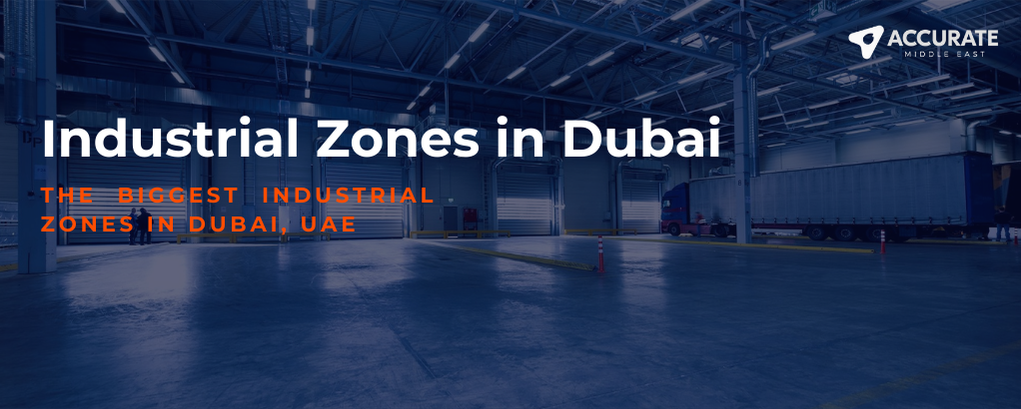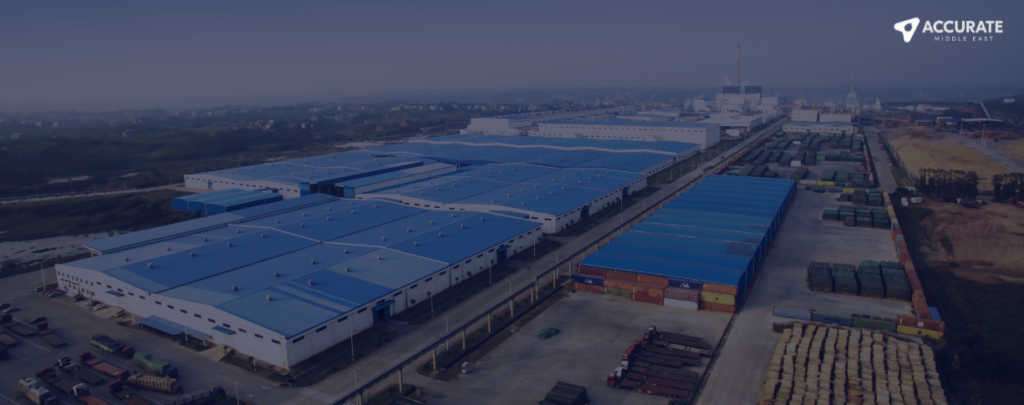Dubai Industrial City has recently announced that it has to add up to 13.9 million sq.ft. of additional land capacity within its ecosystem to help boost UAE’s manufacturing sector. Land occupancy at the manufacturing destination of Dubai Industrial Zone grew by 12% year-on-year (YoY) to reach 97% in the first quarter of 2024. So that it has recorded a sustain growth in 2023, where Dubai Industrial City’s ecosystem of customers grew by 17% to reach more than 1,000 local, regional, and international heavyweights.

Industrial zones Dubai
The biggest Dubai’s industrial zones
Dubai, renowned for its strategic location, modern infrastructure, and business-friendly environment, has become a magnet for entrepreneurs and investors worldwide. Among its many offerings, Dubai’s industrial zones stand out as a key component in the emirate’s economic landscape. These zones provide an ideal setting for businesses looking to establish a strong foothold in the Middle East. So this article delves into the significance of Dubai’s industrial zones and offers practical tips for entrepreneurs aiming to start a business in the UAE.
Understanding Industrial Zones
Dubai’s industrial zones are designed to support a wide range of industries, from manufacturing and logistics to high-tech and automotive sectors. These zones offer state-of-the-art facilities, robust infrastructure, and various incentives that make them attractive to businesses of all sizes.
1. Jebel Ali Free Zone (JAFZA):
JAFZA is one of the largest and oldest free zones in the UAE, offering businesses easy access to a major seaport, an international airport, and excellent road connectivity. It is home to over 7,000 companies, including Fortune 500 firms.
2. Dubai Silicon Oasis (DSO):
DSO is a technology park that supports high-tech industries, including IT, electronics, and engineering. It provides modern office space, advanced IT infrastructure, and a nurturing environment for innovation.
3. Dubai Industrial City (DIC):
DIC focuses on six industrial sectors: food and beverage, base metals, transport equipment and parts, machinery and mechanical equipment, chemicals, and mineral products. It offers comprehensive solutions to meet the needs of manufacturers and industrial operators.
4. Dubai South:
Dubai South is an emerging urban project that includes a logistics district, an aviation district, and a residential district. It is designed to support Dubai’s vision of becoming a leading logistics and aviation hub.
Today will describe the difference between the two biggest Dubai’s free zones and industrial zones which are not as popular as the first two – Dubai Industrial City and Dubai South. It’s a well-known fact that with the announcement of setting up of a new airport close to Al-Maktoum Airport of Dubai, there is an increase interest to Dubai South direction.
Dubai Industrial City (DIC)
Focus: DIC is designed to cater specifically to various industrial sectors. It focuses on six key sectors: food and beverage, base metals, transport equipment and parts, machinery and mechanical equipment, chemicals, and mineral products.
Location: It is situated near Jebel Ali Port and Al Maktoum International Airport, providing strategic connectivity for manufacturing and logistics operations.
Features: DIC offers comprehensive solutions for industrial operators, including warehouses, logistics facilities, open storage yards, and labor accommodation.
Goal: The primary aim is to create a robust industrial ecosystem that supports manufacturing and logistics operations, fostering growth and innovation in the industrial sector.
Dubai South Industrial Zone
– Focus: Dubai South is a broader, mixed-use development project that includes residential, commercial, logistics, and aviation districts. It is designed to be a fully integrated economic zone supporting various sectors, including logistics, aviation, commercial, and residential.
– Location: It is strategically located around the Al Maktoum International Airport and adjacent to the Jebel Ali Port, offering excellent connectivity for global trade and logistics.
– Features: Dubai South includes the Logistics District, Aviation District, Residential District, and Business Park. It aims to support Dubai’s vision of becoming a leading logistics and aviation hub.
– Goal: The overarching goal of Dubai South is to create a self-sustained city that promotes a diverse range of economic activities and provides a high quality of life for residents and businesses alike.
Scope and Purpose:
– Dubai Industrial City is more focused on catering to specific industrial sectors and providing specialized facilities and infrastructure for manufacturing and logistics.
– Dubai South encompasses a wider range of functions, including residential, commercial, logistics, and aviation, aiming to create a holistic and integrated city.
Development and Infrastructure:
– Dubai Industrial City is primarily an industrial park with a strong emphasis on manufacturing and related activities.
– Dubai South offers a mix of residential, commercial, and industrial facilities, aiming to support various economic activities and provide a comprehensive living and working environment.
Sector Focus:
– Dubai Industrial City targets specific industrial sectors and provides infrastructure tailored to their needs.
– Dubai South supports a broad range of sectors, including aviation and logistics, along with commercial and residential development.
While both Dubai Industrial City and Dubai South play crucial roles in Dubai’s economic landscape, they serve different purposes and cater to different needs within the emirate. Dubai Industrial City focuses on industrial operations and manufacturing, whereas Dubai South offers a more diverse and integrated development supporting various economic activities.

Dubai Industrial zones Accurate ME
Key Benefits of Setting Up
- Tax Benefits and Incentives: Businesses in these zones enjoy several financial incentives, including exemption from corporate tax, personal income tax, and customs duties.
- Ownership and Repatriation: Foreign investors can have 100% ownership of their businesses. Therefore they are allowed to repatriate 100% of their profits and capital.
- Strategic Location: Dubai’s industrial zones offer strategic access to key markets in the Middle East, Africa, and Asia. Thus it makes Dubai industrial zones an ideal for companies looking to expand their global footprint.
- World-Class Infrastructure: The zones are equipped with state-of-the-art infrastructure, including advanced logistics facilities, modern office spaces, and efficient utilities.
- Business Support Services: Companies benefit from a range of support services, such as visa processing, business licensing, and administrative assistance.
Practical Tips for Entrepreneurs who wants to setup a company
1. Conduct Market Research:
Before setting up in an industrial zone, conduct thorough market research to understand the demand for your products or services in the region. Analyze the competitive landscape and identify potential gaps in the market.
2. Choose the Right Zone:
Select an industrial zone that aligns with your business needs. Consider factors such as the nature of your business, the required infrastructure, and the specific incentives offered by different zones.
3. Understand Legal Requirements:
Familiarize yourself with the legal and regulatory requirements for setting up a business in Dubai. This includes understanding the process for obtaining licenses, permits, and visas.
4. Leverage Local Expertise:
Partner with local consultants or business advisors who can provide insights and assist with the setup process. Their expertise can help you navigate the regulatory environment and avoid potential pitfalls.
5. Utilize Government Support Programs:
Take advantage of government programs designed to support SMEs and startups.
Or reach out to us, we will help you with all the necessary steps while launching your business in Dubai. First consultation is free. Let’s discuss your task today! Reach out to us on WhatsApp or call us in the UAE +971 50 599 5603 to get started.



